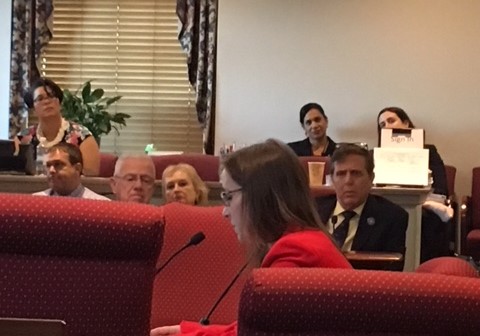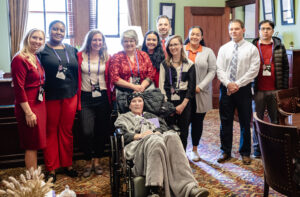
On February 21, seven BAYADA Home Health Care employees, one of whom is a parent and caregiver of a medically complex child, testified in front of a dozen Delaware state legislators and nearly 80 community members to advocate for a Medicaid reimbursement rate increase for registered nurses (RNs) and licensed practical nurses (LPNs).
The Delaware Joint Finance Committee met to hear the Department of Health and Social Services’ (DHSS) annual budget request in what ended up being a crowded room that drew so many members of the public that overflow seating had to be provided in the cafeteria, where a live video feed of the hearing was streamed. Though a few of these advocates were initially hesitant to speak in front of legislators- let alone such a crowd- what kept them going is their commitment to advocating on behalf of home care nurses, their clients, and their clients’ loved ones.
These advocates’ testimonies detailed their personal stories of why the committee should include additional funds to DHSS’s budget to be used to increase the state’s reimbursement rates for RN and LPN care by about 25%. Delaware’s current rates have not been increased in more than ten years, and these current rates are not adequate to keep up with demand for in-home nursing care because of the pressure that low rates place on providers’ ability to recruit and retain quality nurses. With a rate increase for RN and LPN care, providers would be able to attract more nurses to deliver the in-home care that pediatric, adult, and senior home care clients need.
BAYADA registered nurse Jen Saulsbury shared a moving story about two of her pediatric clients and the impact that nursing turnover rates, which stem from Delaware’s low reimbursement rates, has on them. She shared a crayon-drawn card from one of her pediatric clients to accompany her story, which nearly brought the committee to tears.
Committee co-chair Representative Melanie George-Smith and Senator Nicole Poore vocalized their support of increased reimbursement rates for RN and LPN care. It goes to show that advocacy is a powerful force in creating the changes necessary to support home care employees, clients, and their families.

Advocacy is powerful. The stories that these advocates shared in front of the committee were not those of data, numbers, and dollar signs, but rather their unique, passionate perspectives of why this issue is so important that it deserves legislative attention and action.
Advocacy doesn’t necessarily involve testifying in front of a crowded room. It can be sharing your unique story or picture with us, writing an email to a legislator, or participating in a meeting to talk about issues you face every day. A state-funded nursing rate increase cannot happen without getting other passionate individuals involved. If you would like to find out how you can to advocate for better home care laws and regulations, let’s talk about how you can get involved. Email me today!







